Öz
Bu çalışmada üniversite öğrencilerinde stres nedenlerinin ve stresle başa çıkma biçimlerinin belirlenmesi amaçlandı. Betimsel tarama modeliyle yapılan bu çalışma Mart 2014 - Nisan 2015 tarihleri arasında bir devlet üniversitesindeki 504 öğrencinin katılımıyla gerçekleştirildi. Araştırmacıların hazırladığı kapalı uçlu soruları içeren soru formu ve Stresle Başa Çıkma Ölçeği (SBÖ) veri toplama aracı olarak kullanıldı. Araştırmanın verileri SPSS 16 paket programında, Kruskal-Wallis, Mann-Whitney U ve Ki-kare testi ile değerlendirildi. Öğrencilerin SBÖ ve alt boyut puan ortalamaları karşılaştırıldığında; sadece cinsiyet ve lisansüstü eğitim alma isteği değişkenlerinde anlamlı farklılıklar belirlendi. Kız öğrencilerin sosyal destek boyutundan aldıkları puanlar erkek öğrencilere göre, lisansüstü eğitim almak isteyenlerin problem odaklı başa çıkma puanları lisansüstü eğitim almak istemeyenlere göre daha yüksek bulundu (p<0,05). İlişkilerin çıkara dayanması (%90,5), öğretim elemanlarının öğrenciler arasında ayrım yapması (%89,3) ve derslerin yoğunluğu (%89,1) öğrenciler arasında strese neden olduğu beyan edilen ilk üç durum olarak tespit edildi. Seçmeli derslerin yetersiz, teorik derslerin çok fazla olmasının, mezuniyet sonrası ne yapacağını bilmemenin ve öğretim elemanlarının öğrenciler arasında ayrım yapmasının strese neden olduğuna katılım öğrencilerin okuduğu fakülte/yüksekokul açısından farklılık göstermekteydi. Üniversite öğrencilerinin stresle baş etmede problem odaklı baş etme yolunu daha çok tercih ettikleri, öğrencilerin stresle baş etme yöntemlerinin yaş, okunulan fakülte/yüksekokul, üniversite eğitimi sırasında barınılan yer, aylık gelir, anne, baba eğitimi açısından farklılık göstermediği sonucuna varıldı. Bununla birlikte, cinsiyetin kız olması ve lisansüstü eğitim almayı isteme stresle baş etme yöntemlerini değiştirmekteydi.
Anahtar Kelimeler
Kaynakça
- Abdel Rahman, A. G., Hashim B. N., Hiji N. K., Al-Abbad Z. (2013). Stress among medical Saudi students at College of Medicine, King Faisal University, Journal of Preventive Medicine and Hygiene 54(4), 195-199. Akgemci, T. (2001). Örgütlerde stres ve yönetimi. İktisadi ve İdari Bilimler Dergisi, 15(1-2), 301-309. Akpınar, B. (2013). Öğretmen adaylarının stres nedenleri, Kalem Eğitim ve İnsan Bilimleri Dergisi, 3(2), 147-174. Ardıç, A. (2009). Öğrencilerde strese neden olan etkenler ve başa çıkma davranışları, T.C. Millî Eğitim Bakanlığı, Eğitimi Araştırma ve Geliştirme Dairesi Başkanlığı, Ankara. Avşaroğlu, S. ve Üre, Ö. (2007). Üniversite öğrencilerinin karar vermede özsaygı, karar verme ve stresle başaçıkma stillerinin benlik saygısı ve bazı değişkenler açısından incelenmesi, Selçuk Üniversitesi Sosyal Bilimler Enstitüsü Dergisi, (18), 85-100.
Öz
The purpose of this study was to determine the reasons of stress and the ways of coping with stress in university students. The study which was conducted with descriptive scanning model was completed with 504 students at a public university between March 2014 and April 2015. A questionnaire with close-ended questions formed by researchers and the Scale of Coping with Stress (SCS) were used as data collection tools. The data of the study were evaluated in SPSS 16 software package with Kruskal-Wallis, Mann-Whitney U, and Chi-square tests. Comparing the SCS and subscale mean scores of students; significant differences were determined only in the variables of gender and desire to receive postgraduate education. It was found that female students obtained higher scores from the social support scale compared to male students and students desiring to receive postgraduate education had higher problem-focused coping scores compared to those not desiring to receive postgraduate education (p<0.05). The first three conditions causing stress in students were determined as benefit-oriented relations (90.5%), discrimination among students made by instructors (89.3%) and intensity of courses (89.1%). Agreeing with the fact that inadequate elective courses, abundant theoretical courses, obscurity after graduation and discrimination among students made by instructors cause stress varied in terms of the faculty/vocational high school of students. It was concluded that university students mostly preferred problem-focused coping method in coping with stress and the methods of students to cope with stress did not differ in terms of their age, faculty/ vocational high school, accommodation during undergraduate education, monthly income and parents' education. Additionally, the female gender and the desire to receive postgraduate education changed the methods of coping with stress.
Anahtar Kelimeler
Kaynakça
- Abdel Rahman, A. G., Hashim B. N., Hiji N. K., Al-Abbad Z. (2013). Stress among medical Saudi students at College of Medicine, King Faisal University, Journal of Preventive Medicine and Hygiene 54(4), 195-199. Akgemci, T. (2001). Örgütlerde stres ve yönetimi. İktisadi ve İdari Bilimler Dergisi, 15(1-2), 301-309. Akpınar, B. (2013). Öğretmen adaylarının stres nedenleri, Kalem Eğitim ve İnsan Bilimleri Dergisi, 3(2), 147-174. Ardıç, A. (2009). Öğrencilerde strese neden olan etkenler ve başa çıkma davranışları, T.C. Millî Eğitim Bakanlığı, Eğitimi Araştırma ve Geliştirme Dairesi Başkanlığı, Ankara. Avşaroğlu, S. ve Üre, Ö. (2007). Üniversite öğrencilerinin karar vermede özsaygı, karar verme ve stresle başaçıkma stillerinin benlik saygısı ve bazı değişkenler açısından incelenmesi, Selçuk Üniversitesi Sosyal Bilimler Enstitüsü Dergisi, (18), 85-100.
Ayrıntılar
| Birincil Dil | Türkçe |
|---|---|
| Bölüm | Makaleler |
| Yazarlar | |
| Yayımlanma Tarihi | 29 Eylül 2015 |
| Yayımlandığı Sayı | Yıl 2015 Cilt: 8 Sayı: 4 |
Adres: Uşak Üniversitesi Sosyal Bilimler Enstitüsü
Telefon: 0276 221 21 60 Faks :0276 221 21 61
E-posta: sosyaldergi@usak.edu.tr

